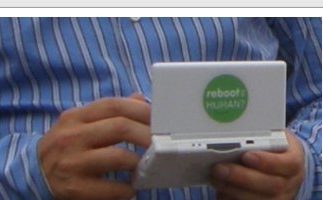The MIT Media Lab has launched a new research initiative to develop a $100 laptop—a technology that could revolutionize how we educate the world’s children.
This is a mindblowing initiative, delivering the visions of one of my true heroes, Allan Kay. There’s no doubt about it, I have high hopes for this.
The question is however…Does every child need a laptop? I actually believe so, but there are a lot of problems as well, and as a true “technologist”, I might not be able to view this in a truely objective manner.
First, since it’s such a low powered computer, it must be somewhat limited what you can do with it. I’d like a laptop for children to be a creative tool e.g. for the creation of music, this might prove to be too much, at least for the initial design, to handle.
It also remains to be seen what the laptop could be used for, the initial spec are quite high-level, but it looks like it will be a generalised “Internet appliance”. All the software components to make this a reality, already exists, just install Linux, including Internet tools like Firefox, Gaim etc.
I do however see many problems in giving children a general Internet appliance…While the Internet is fantastic – in my opinion it’s the greatest invention since publishing itself – there’s lots of “bad” things out there.
Firstly, there’s content that isn’t suited for children (or anyone). Secondly, there are “predators”, e.g. child abusers, on the Internet, and finally, the content on the Internet is currently dominated by western culture – I call it “information imperialism”.
Then again, the perfect way to fight “information imperialism”, would be to give everybody in the world the abilbity to produce and publish digital content. Imagine how fantastic it would be if all children, and grown ups in the third world, had the ablitiy to publish music, text, images etc., on the Internet.
Returning to the dangers the Internet poses to children, a possible solution could be to devise some kind of child oriented UI, with limited access to the Internet.
The best way to acheive this “shielded” environment, could be to offer it through an application server.
My vision for a computer for children would supply access to services like this:
Dictionary tools – services like Wikipedia
Blogging and writing tools
Calculation tools focusing on science and math. I envision software that can be used to graphically display functions etc.
Music tools, eg. for composition
Graphical tools, eg. for drawing
Community tools – services like instant messaging, forums, e-mail
Educational games
Another possibililty that the $100 Laptop creates, is a serious incentive to make textbooks available in digital format written, as well as audio. There are many obstacales on the road to making this a reality, not the least copyright issues – it’s clear, at least to me, that textbooks and other educational material should be offered under some kind of open source license, like Creative Commons. This calls for a complete rethink of the business models for publishing educational material.
I sympatise with the people, e.g. “filesharers”, that advocate that all information should be free, and who are actively sharing things like copyrighted textbooks on p2p networks. But under current law, what they’re doing is actually theft, even if they don’t make money from it. I do agree with the filesharers that “resistance isn’t futile”, and I do hope that their resistance can help change the laws, but I disagree with their methods.
I seriously hope that the copyright hurdles are cleared, because the road will then be paved for a true revolution, and democratisation, of education.
